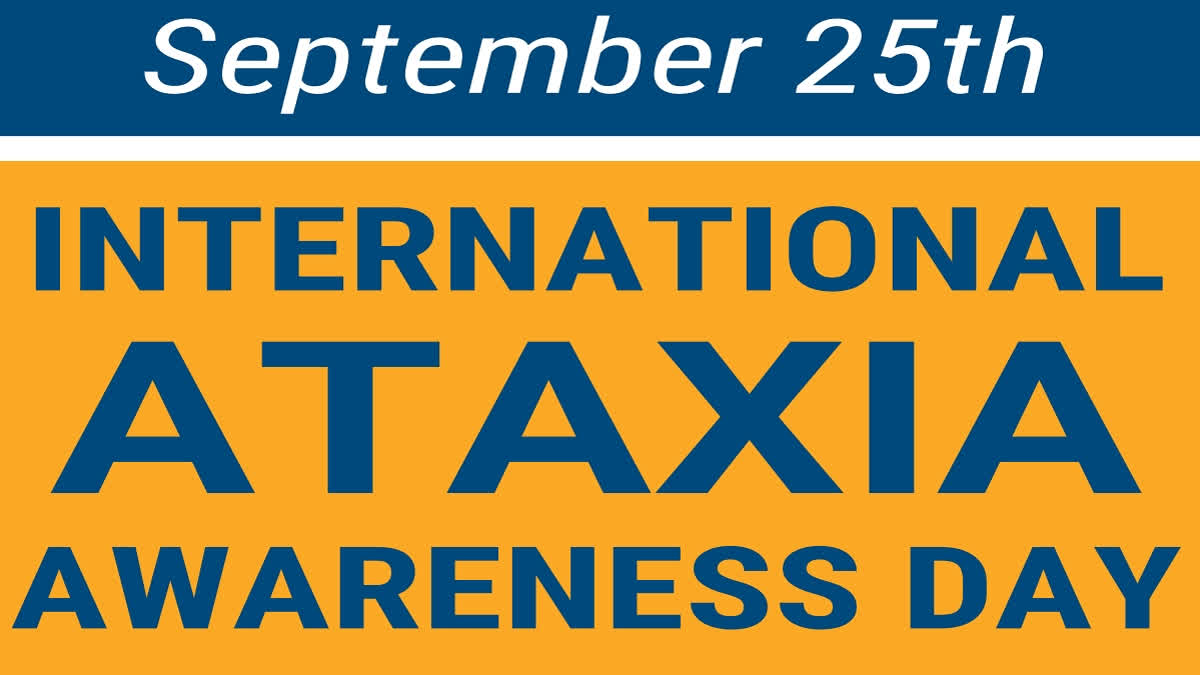Hyderabad: International Ataxia Awareness Day is an annual event dedicated to raising awareness about ataxia, a rare neurological disorder that affects coordination, balance, and speech. It is observed on September 25 across the globe.
This global day of recognition aims to increase public understanding of ataxia, highlight the challenges faced by those living with the condition, and promote research towards finding effective treatments and ultimately a cure. By bringing attention to ataxia, this day seeks to support those affected and encourage communities to learn more about this often misunderstood condition.
What is Ataxia?: Ataxia is a degenerative disease of the nervous system. Many symptoms of Ataxia mimic those of being drunk, such as slurred speech, stumbling, falling, and incoordination. These symptoms are caused by damage to the cerebellum, the part of the brain that is responsible for coordinating movement. Ataxia treatment involves a combination of medication to treat symptoms and therapy to improve quality of life.
People affected by Ataxia may experience problems with using their fingers and hands, arms, legs, walking, speaking or moving their eyes. Ataxia affects people of all ages. Age of symptom-onset can vary widely, from childhood to late adulthood. Complications from the disease are serious and oftentimes debilitating. Some types of Ataxia can lead to an early death.
Symptoms: Ataxia symptoms vary by person and type of Ataxia. The rate of progression varies as well. Symptoms may worsen slowly, over decades – or quickly, over mere months. Common symptoms of Ataxia are: Lack of coordination, Slurred speech, Trouble eating and swallowing, Deterioration of fine motor skills, Difficulty walking, Gait abnormalities, Eye movement abnormalities, Tremors and Heart problems
History of the Event: International Ataxia Awareness Day was established by patient advocacy groups, including the National Ataxia Foundation (NAF), to increase global awareness of ataxia and to advocate for those affected by the condition. The day has grown in significance over the years, with participation from individuals, organisations, and communities around the world. Through education, advocacy, and fundraising efforts, International Ataxia Awareness Day continues to play a crucial role in supporting the ataxia community and driving research efforts towards finding a cure.
Types of Ataxia: There are three main types of ataxia:
Cerebellar: Many cases of ataxia are as a result of damage to a part of the brain called the cerebellum, which serves as the balance and coordination center. The cerebellum assists in muscle coordination and helps maintain balance while walking or performing other movements, along with coordinating eye movements, speech and swallowing.
Sensory: Sensory ataxia is a result of damage to the spinal cord, impairing the ability to coordinate the body and limbs for movement.
Vestibular: Vestibular ataxia affects one's sense of balance and spatial orientation. Because the brain uses information from the vestibular system for movement, when the vestibular system is affected so is motion.
Treatment: Many research efforts are currently underway to find more effective treatments for Ataxia. Currently, there is no cure for ataxia. For cases of ataxia brought on by non-genetic causes such as stroke or benign tumor, there may be treatments that can help. But for those with a genetic cause, research may one day hold the key to a treatment or cure.
Causes of Ataxia: Hereditary Ataxias are genetic, which means they are caused by a defect in a certain gene that is present from the start of a person’s life, inherited from your parents. Hereditary Ataxias can be divided into those that are dominantly inherited, passing from generation to generation due to a single copy of a defective gene passing from parent to child, and those that are recessively inherited, Ataxia seen in a single generation and is due to two copies of a defective gene; one passed from each parent (who are carriers) to the child.
How does the National Ataxia Foundation (NAF) help?: NAF is a world leader in the Ataxia research field. NAF is committed to providing information and education about Ataxia, support groups for those affected by Ataxia, and promoting and funding research to find the cause for the various forms of ataxia, better treatments, and, hopefully someday, a cure.
NAF has been at the forefront of funding promising worldwide research to find answers. Ataxia research has moved into the clinical phase, and pharmaceutical companies have begun recruiting participants for clinical trials. Individuals with Ataxia or who are at-risk for Ataxia are encouraged to enroll in the CoRDS Ataxia Patient Registry.



